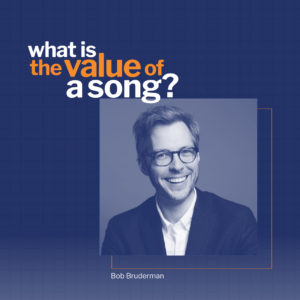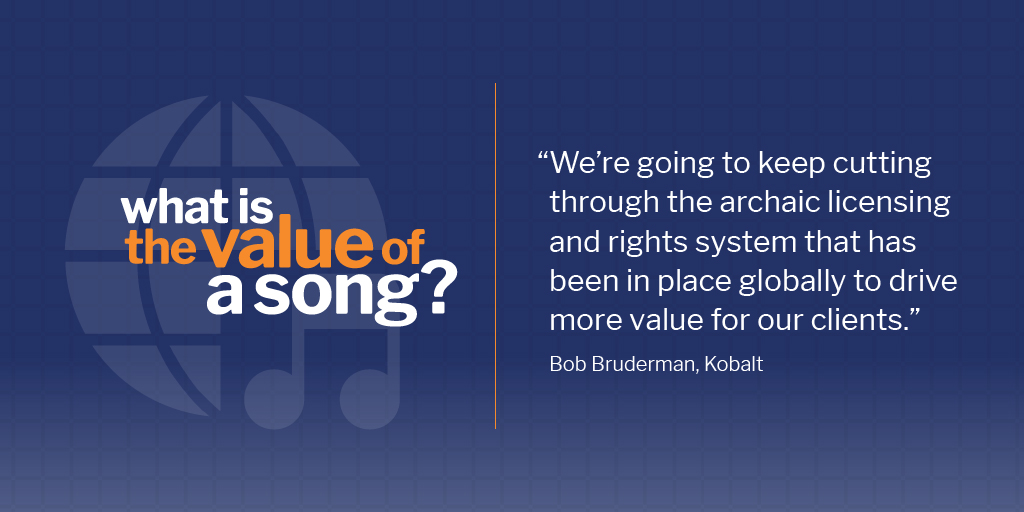By Isabelle Speerin
Kobalt’s Executive Vice President of Global Digital Partnerships Bob Bruderman knew the tide was turning. After eleven years at Sony Music Entertainment, mostly spent in publishing and navigating complex digital deals, it was clear the industry was on the brink of disruption.

Kobalt, founded in 2000 by a Swedish saxophonist, led the way with a radical new model allowing songwriters to retain full ownership of their copyrights and unprecedented access to streaming data. “I wanted to be a part of a songwriter-friendly model and help the industry transform into a much more modern and fair business,” said Bruderman about his motivations to join Kobalt in 2013.
Raised in South Florida to music-loving parents, Bruderman was born with a natural musical gift and appreciation for creators. As a kid, he played the saxophone and guitar. “I was in jazz and symphonic bands and became a drum major in high school,” he recalled. “I was also in punk bands, ska bands, indie rock bands, blues bands – you name it!”
Bruderman explored his love of the arts by studying film and philosophy at the University of Miami. In 2001, he graduated and moved to New York to start his career.
After a short stint at a film and television post-production studio, Bruderman landed his first job in the music industry as a temp at Sony Music Entertainment. Over the next few years, he learnt all facets of the business, from synch to distribution to artist royalties. He eventually moved into US mechanical licencing at the label. “I became well-versed in anything publishing related to the US, and to some degree Canada, and then gravitated towards what was happening in the digital space,” he explained.
During his eleven years at Sony, Bruderman worked with almost all of the key music publishers in the US and became increasingly aware of a number of rising companies with innovative business models. He decided to join Kobalt in a hybrid role focused on growing strategic partnerships and overseeing relationships with some of Kobalt’s largest clients, like Paul McCartney’s company, MPL Communications.
“In pretty short order, the rapid development of the digital marketplace resulted in me spending the majority of my time dealing with the commercial aspects of our global deals with the licensees,” he said. Today, Bruderman’s role is broad and has evolved to touch on all aspects of operations, primarily the digital marketplace and public policy. His team closes around 100 deals a year.
“We try to be supportive of our digital partners and help create a healthier ecosystem rather than viewing them as adversaries at every juncture,” he said. “That has really helped us try new innovative partnership opportunities outside of just licensing.”
Headquartered in New York City, Kobalt has 14 offices spanning the US, Europe, Asia, and Australia. The company recently announced a new office in France. A top-of-the-line publishing roster includes music legends like Elvis Presley, John Denver, Kelly Clarkson, Finneas, The Weeknd, Mahalia, Beck, Childish Gambino, Stevie Nicks, Diplo, Ellie Goulding, Foo Fighters, Lorde, Trent Reznor, Gunna, and Roddy Ricch. In fact, Kobalt represents over 40 per cent of the top 100 songs and albums in both the US and UK.
One of the unique ways Kobalt supports their songwriters is through pipeline advances, where writers can log into their online portal and access projected revenue for the quarter. “We also provide creative services to place songs for certain albums and put writing sessions together and our synch team helps songwriters break a specific track,” he explained.
Asked for his thoughts on the value of a song, Bruderman states, “Songs are capsules of DNA of the human experience and soul: they magically capture moments of transcendence, thought, love, revolution, faith, grace, disappointment, pain, and joy. We need the revolution of the heart that only songs can capture now more than ever.”

According to Bruderman, it’s been encouraging to see Kobalt’s writers leverage modern technology in new ways to help create songs and reach out to fans during the COVID-19 pandemic. “Writers are using whatever technology they can and connecting with fans through livestreams and other meaningful social platforms and it’s been nothing short of incredible,” he remarked.
He also notes a recent explosion of activity in the fitness landscape. “It’s been a trend for a few years now,” he said. “and we’re seeing it accelerate because of COVID-19 and I expect that to continue in the future.”
Looking ahead, Kobalt plans to continue finding ways to reinvent the music industry. “We’re going to keep cutting through the archaic licensing and rights system that has been in place globally to drive more value for our clients,” Bruderman said. “In my world, that’s striking more direct deals with emerging and regional services.
Industry-wide, a significant amount of regulatory change is still necessary to see real change. “There are other areas of rights where we have more flexibility and we have certainly been trying to push it as far as we can in a way that is beneficial to songwriters,” he said. “That means more transparency and more songs and recordings being paid.”
Bruderman has worked with CMRRA in various capacities over the last six years. “I really like the team and it’s a meaningful and important organization for us to support,” he said. “We think they do a good job for us.”
In addition to CMRRA’s Canadian Publishers Committee, Bruderman sits on the newly established Mechanical Licensing Collective (MLC) Board of Directors and is also a Director on the Music Business Association Board, DDEX, and the AMRA Board, Kobalt’s global digital collection society. He has been recognized as a Billboard Digital Power Player in both 2018 and 2019.
Bruderman lives in New York City with his wife and their newborn baby.
Thinking about becoming a client of CMRRA? Already a client but you have questions? Email us at [email protected] and we’ll get you the answers you need.


